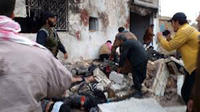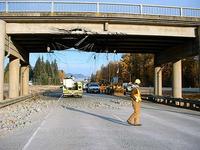-
Turmoil in Turkey is about the future identity of the country

The demonstrations in Istanbul began as a neighborhood protest against the government’s plan to build a shopping mall on the site of a popular park. Soon, however, the demonstrations spread to other cities, and spokespeople for the demonstrators emphasized that the park issue was symbolic, and that it stood for deeper issues. This growing unrest may yet unleash deeper forces within Turkish society.
-
-
U.S. unlikely to meet its biofuel goals

The Energy Independence and Security Act of 2007 (EISA) mandates that by 2022 the United States derive fifteen billion gallons per year of ethanol from corn to blend with conventional motor fuels. A new study says that if the climate continues to evolve as predicted by the Intergovernmental Panel on Climate Change, the United States stands little to no chance of satisfying its biofuel goals.
-
-
McCain: military aid to rebels, no-fly zone necessary as Assad gaining “upper hand”

Senator John McCain (R-Arizona) said it is “ludicrous” to believe that Syrian president Bashar al-Assad would negotiate a diplomatic solution to the county’s civil war at an upcoming summit. McCain says that providing military aid to the anti-Assad rebels and imposing a no-fly zone over Syria would more likely yield results than a summit meeting in Geneva.
-
-
Government-developed standards not an effective cybersecurity approach: analyst
DHS said the department has “recently learned of a vulnerability that existed in the software used by a DHS vendor to process personnel security investigations.” analyst says that it is bad enough that hackers gained access to the personal information of thousands, but what is even more worrisome is the fact that DHS, with it spotty cyber security record, has been placed in charge of regulating the cybersecurity efforts of critical infrastructure industries.
-
-
Hagel says Chinese cyberattacks a “growing threat”
Defense Secretary Chuck Hagel warned of a “growing threat” of cyberattacks against the United States, saying that America and its allies need to “establish international norms of responsible behavior in cyberspace.” Hagel spoke to an audience of defense analysts and defense ministers from Asia and Europe at the annual conference of the International Institute for Strategic Studies on Saturday.
-
-
Reid confident immigration reform bill will pass the Senate

Senate Majority Leader Harry Reid (D-Nevada) said passage of the immigration bill will be relatively easy, and that he believes the bill will be supported by at least eight Republican, in addition to votes from nearly all Democratic members.
-
-
Bloomberg group presses lawmakers to close FBI’s gun “terror gap”
New York City mayor Michael Bloomberg’s group, Mayors Against Illegal Guns, has turned its attention to Senators Kelly Ayotte (R-New Hampshire), Jeff Flake (R-Arizona), and Max Baucus (D-Montana) to gain their support for a gun bill which would prevent people on the U.S. terrorist watch list from passing background checks for guns.
-
-
Former CIA chief: NYPD surveillance would have prevented Boston-like attacks

Former CIA director Michael Hayden said a terror attack like the Boston Marathon bombings would never have taken place in New York City. Hayden, who also headed the National Security Agency (NSA), said the New York Police Department’s (NYPD) broad campaign of spying on the Muslim communities in the city would have helped officials identify the radical tendencies of the alleged bombers, thus preventing the attack.
-
-
Lawmaker offers a way to finance U.S. infrastructure investment -- with no taxpayers’ money

Representative John Delaney (D-Maryland) says has an answer to the nation’s infrastructure problems, and that it will not cost taxpayers a dime. The money will be raised through the sale of special bonds, not guaranteed by the government, to companies that earn profits outside the United States.
-
-
House panel cuts DHS chemical plant monitoring program’s budget
Budget authors in the House proposed cutting almost $9 million from what DHS had requested for high-risk chemical tracking in the 2014 fiscal year. The House Appropriations Committee, indicating its lack of confidence in DHS’s oversight of fertilizer plants like Texas’s West Fertilizer Company, which exploded earlier this year, also withheld $20 million from the program until DHS responded in detail to questions the committee sent the department.
-
-
California Democratic lawmakers want a go-slow approach to fracking
California may be on the verge of an oil rush. It is estimated that hydraulic fracturing, or fracking, at the Monterey Shale formation may tap reserves of fifteen billion barrels of oil. Democratic lawmakers do not see it that way, and have proposed numerous anti-fracking bills aiming to control the use of the controversial technology. Ten bills have been tabled so far, and more are on the way.
-
-
Chinese government hackers steal designs of advanced U.S. weapons systems
The Chinese government has been conducting a broad, sustained, and disciplined campaign of cyberattacks against U.S. government agencies, critical infrastructure, private companies, and news organizations. The public version of a study prepared for the Pentagon by the Defense Science Board now says that Chinese government hackers have also been able to penetrate the computer networks of all the major U.S. defense contractors, stealing the designs and specifications of the most advanced weapon system in the U.S. arsenal, and gaining insights into broad technologies on which U.S. military advances are based.
-
-
What we keep forgetting about immigration reform
Next month, when the Senate debates immigration reform, our elected politicians should be reminded of their responsibility to negotiate new immigration laws which finally bring sanity and fairness to all Americans and, as well, to those who would choose to become new Americans.
-
-
U.S. infrastructure drops in world infrastructure ranking

The U.S. infrastructure has slipped badly in the world’s infrastructure ranking, both in absolute and relative terms, according to the Global Competitiveness Report for 2012-13, published earlier this month by the World Economic Forum.
-
-
San Diego to receive $16.9 million in DHS funding
Some cities see DHS cutting its funding for their terrorism-related programs, but other cities see such funding increasing. A case in point is San Diego, which will receive $16.9 million in DHS funding to strengthen the city’s security against terrorist attacks.
-
More headlines
The long view
Preventing Another 'Jan. 6' Starts by Changing How Elections Are Certified, Experts Say
The 2024 presidential election may be a rematch between President Joe Biden and former President Donald Trump, but preventing a repeat of Jan. 6, 2021 — when false claims of a stolen election promoted by Donald Trump and his allies led to an insurrection at the U.S. Capitol —will be top of mind this election year. Research finds broad support among public for nonpartisan certification commissions.
States Rush to Combat AI Threat to Elections
This year’s presidential election will be the first since generative AI became widely available. That’s raising fears that millions of voters could be deceived by a barrage of political deepfakes. Congress has done little to address the issue, but states are moving aggressively to respond — though questions remain about how effective any new measures to combat AI-created disinformation will be.
Chinese Government Hackers Targeted Critics of China, U.S. Businesses and Politicians
An indictment was unsealed Monday charging seven nationals of the People’s Republic of China (PRC) with conspiracy to commit computer intrusions and conspiracy to commit wire fraud for their involvement in a PRC-based hacking group that spent approximately 14 years targeting U.S. and foreign critics, businesses, and political officials in furtherance of the PRC’s economic espionage and foreign intelligence objectives.
European Arms Imports Nearly Double, U.S. and French Exports Rise, and Russian Exports Fall Sharply
States in Europe almost doubled their imports of major arms (+94 per cent) between 2014–18 and 2019–23. The United States increased its arms exports by 17 per cent between 2014–18 and 2019–23, while Russia’s arms exports halved. Russia was for the first time the third largest arms exporter, falling just behind France.
LNG Exports Have Had No Impact on Domestic Energy Costs: Analysis
U.S. liquified natural gas (LNG) exports have not had any sustained and significant direct impact on U.S. natural gas prices and have, in fact, spurred production and productivity gains, which contribute to downward pressure on domestic prices.
Don’t Buy Moscow’s Shameless Campaign Tying Biden to Its Terrorist Attack
Russia has offered many different explanations to the ISIS-K’s 22 March 2024 terrorist attack at the Crocus City Hall in Moscow, but the most recent explanation offered by Russia is the most audacious yet: Russia now charges that the Ukrainian energy company Burisma financed the attack. Burisma is at the center of an effort by a congressional committee to impeach President Biden, but the case has all but collapsed. Hunter Stoll writes that Russia’s disinformation and propaganda apparatus appears to be searching for ways to keep Burisma in the news ahead of the U.S. presidential election.
